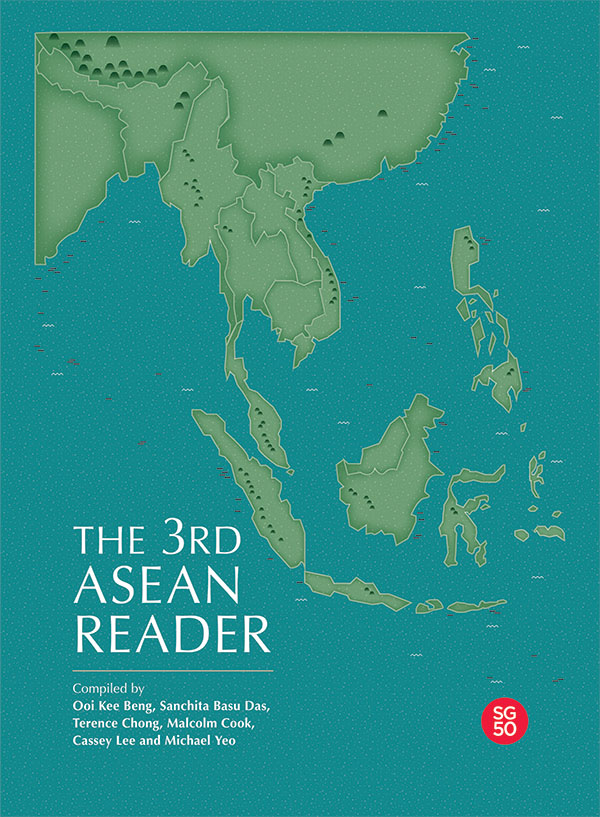Book contents
- Frontmatter
- Contents
- Preface
- Forewords to the First and Second ASEAN Reader: ASEAN: Conception and Evolution
- Forewords to the First and Second ASEAN Reader: ASEAN: The Way Ahead
- Forewords to the First and Second ASEAN Reader: New Challenges for ASEAN
- SECTION I ASEAN: THE LONG VIEW
- SECTION II COUNTRY ANALYSES
- SECTION III COMPARATIVE ANALYSES OF THE REGION
- Southeast Asian Societies
- The Southeast Asian Economy
- Southeast Asian Politics
- SECTION IV INTERNATIONAL DEVELOPMENTS
- SECTION V INSTITUTIONS OF ASEAN
- SECTION VI ASSESSING ASEAN'S INTERNAL POLICIES
- Section Introduction by
- 37 Challenging ASEAN: A “Topological” View
- 38 Thinking and Feeling ASEAN: The Challenges of Integration and Identity
- ASEAN Political Security Community
- ASEAN Economic Community
- ASEAN Socio-Cultural Community
- SECTION VII ASSESSING ASEAN'S EXTERNAL INITIATIVES
- ASEAN Processes
- ASEAN's Major Power Relations
- SECTION VIII SOUTHEAST ASIA: PERIPHERAL NO MORE
- Bibliography
- The Contributors
- The Compilers
37 - Challenging ASEAN: A “Topological” View
from SECTION VI - ASSESSING ASEAN'S INTERNAL POLICIES
Published online by Cambridge University Press: 22 June 2017
- Frontmatter
- Contents
- Preface
- Forewords to the First and Second ASEAN Reader: ASEAN: Conception and Evolution
- Forewords to the First and Second ASEAN Reader: ASEAN: The Way Ahead
- Forewords to the First and Second ASEAN Reader: New Challenges for ASEAN
- SECTION I ASEAN: THE LONG VIEW
- SECTION II COUNTRY ANALYSES
- SECTION III COMPARATIVE ANALYSES OF THE REGION
- Southeast Asian Societies
- The Southeast Asian Economy
- Southeast Asian Politics
- SECTION IV INTERNATIONAL DEVELOPMENTS
- SECTION V INSTITUTIONS OF ASEAN
- SECTION VI ASSESSING ASEAN'S INTERNAL POLICIES
- Section Introduction by
- 37 Challenging ASEAN: A “Topological” View
- 38 Thinking and Feeling ASEAN: The Challenges of Integration and Identity
- ASEAN Political Security Community
- ASEAN Economic Community
- ASEAN Socio-Cultural Community
- SECTION VII ASSESSING ASEAN'S EXTERNAL INITIATIVES
- ASEAN Processes
- ASEAN's Major Power Relations
- SECTION VIII SOUTHEAST ASIA: PERIPHERAL NO MORE
- Bibliography
- The Contributors
- The Compilers
Summary
Security and economy have been, and remain, the standard fare of ASEANology. Democracy has been an afterthought in this literature. That is partly why I have chosen, in this article, to feature democracy to the relative neglect of security and economy.
I begin by drawing what I hope are some useful analytic distinctions between Southeast Asia as a region and ASEAN as an organization. Next I discuss the challenge of transforming Southeast Asia into something more than a collection of states — that is, a community. I then ask whether the Association can and should favour democracy in Southeast Asia on the one hand, and inside its own organization on the other. I close by returning to my point of departure in the above epigraphs to discuss ASEAN's delayed response to the 2007 crisis in Myanmar in the context of democracy in the region and in the organization.
REGION ≠ ORGANIZATION
Southeast Asia the region and ASEAN the organization are not the same thing. It is not quixotic, however, to question the isomorphism of ASEAN and Southeast Asia that the Association has so successfully cultivated for so long. Two objections come to mind. One is spatial, one is social, both are political, and both are, in their own ways, “challenging ASEAN”.
The spatial caveat entails this question: What happened on 20 May 2002, when the former Indonesian province of Timor-Leste was internationally recognized as an independent state that did not then, and in 2007 still had not, joined ASEAN? By that account, the region trumped regionalism, and from that date onward, ASEAN could no longer claim to represent all of Southeast Asia.
Timor-Leste wants to join ASEAN, but ASEAN has been less than eager to let it in. That reluctance reflects four non-technical concerns: that Timor-Leste is either a failed or failing state whose membership could become a headache for the other members; that its abject poverty could burden them materially as well; that its foreign policies might be too heavily influenced by outsiders, notably Australia and Portugal; and that its leaders’ public criticism of the junta in Myanmar for violating human rights could augur disloyalty to the speak-no-evil-of-a-fellow-member “ASEAN Way”.
- Type
- Chapter
- Information
- The 3rd ASEAN Reader , pp. 193 - 197Publisher: ISEAS–Yusof Ishak InstitutePrint publication year: 2015



